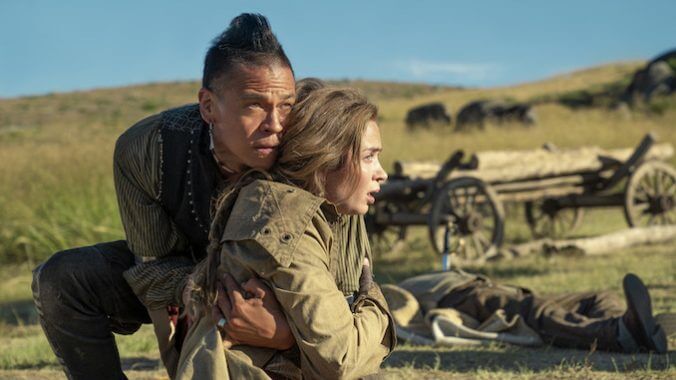Prime Video’s The English Is a Disappointing Shadow of What Could Have Been
Photo courtesy of Prime Video TV Reviews The English
There’s an interesting contrast between Emily Blunt’s role in the Denis Villeneuve film Sicario and in the new Hugo Blick-directed Prime Video series The English. In both cases, she’s a competent, self-assured character, tougher by far than your average man or woman, who finds herself thrust into a world of almost unreal hostility and violence. In Sicario, it’s the world of Mexican drug trafficking, and the FBI special agent she plays is gradually ground down by the almost amoral, extralegal reality of how things are done when law and order holds no sway. By the conclusion of that film, she is practically shattered, unable to rationalize the horror of what she’s seen and how it conflicts with her values. In The English, on which Blunt is also an executive producer, her Lady Cornelia Locke is also dropped headfirst into an unforgiving climate, this time the old American west. She’s on a mission to avenge her dead son, but though she’s greeted by almost constant bloodshed and the darkest sides of humanity, she seems almost unaffected. She’ll shoot, she’ll kill, and a moment later she’ll be laughing as she has a picnic in an impossibly elegant dress.
Which is the better choice? That’s probably a question without an answer, since it depends so much on context, but while Sicario is… well, it’s Sicario, The English seems to promise a little bit more than it can deliver. Blunt stars alongside Chaske Spencer as Eli Whipp, an American Indian who has just finished work as an army scout. They cross paths under horrendous circumstances, and Lady Cornelia convinces him to start with her toward Wyoming territory. He just wants a piece of land—which everyone likes to remind he’ll never have, due to his skin—while she’s out for vengeance, the circumstances of which are cloudy at the start.
This is a show of gorgeous western vistas, with the shot of a lone rider framed from the side against a sunset horizon a particular favorite (so much so that it almost becomes a mannerism). There’s a hint of Terrence Malick poetry in here, although far more literal and less committed, and at its best, it’s visually appealing. There are great acting turns, too, particularly by Toby Jones—who in a very short, one-episode arc steals every scene he’s in. Spencer, as Whipp, is laconic to the point of cliche, the American Indian version of every quiet-tough-guy-with-a-heart-of-gold you’ve seen in westerns since they first started making westerns. But within that context he’s a solid presence, and Blunt is her usual capable self. In both cases, though, there’s something naggingly shallow about the characters—entirely due to the writing—that puts a ceiling on the show’s quality. This is not a superficial shoot-em-up, but it also never captures the aching melancholy of seminal western TV series like Lonesome Dove. It seems to exist in between, unable to commit because at heart there isn’t an ironclad vision for what the show should be.
Even to call it entertaining, which it often is, necessitates a qualifier: the fight scenes verge on two-dimensionality (particularly with the villains, who all seem to be cast from the same creepy mold), and the contemplative passages can be boring. To go back to the Sicario comparison, there’s also a sense that Lady Cornelia Locke in particular is incomplete; we’re asked to accept her transition into full-blown western soldier on the basis of her father being a soldier, but it never feels earned. While Blunt is too good to devolve into the realm of cliche, the script doesn’t let her achieve much depth, either.
A decade ago, writing about another Hugo Blick show called The Shadow Line, I praised the atmosphere of the show, but wrote, “the actual nuts-and-bolts narrative of the show, while it follows a cogent line of reasoning, is ultimately poor to the point of being laughable.” Things aren’t that dire in The English, at least through the opening episodes, but there’s a similar dichotomy between the aura of the filmmaking and what it’s actually trying to say and do on a plot level. The former piques the interest, at worst, while the latter ranges between indecipherable and unsatisfying. As with the police drama in The Shadow Line, you simply can’t make a western without a rock solid story and expect it to thrive.
The English does not quite thrive, but where it fails, it fails in intriguing ways. If that seems like the faintest praise possible, well, when the rubber meets the road it’s not a show that I’ll continue watching beyond the obligations of this review. Even so, it falls into that category where I’ll at least wonder if I’m making the wrong choice. But then it will occur to me, as it does now, that if TV has its own version of the “homer,” I’m a homer for westerns, and this still didn’t quite hit. The title here (which is somewhat cringe-ily stated in Blunt’s first voiceover) refers to the way in which, to some American Indians, all the encroaching white people are referred to as “The English.” It’s an interesting bit of trivia, yet you can’t help but feel that this show sees its characters in the same monochromatic light, and never does enough to distinguish one human from the next.
The English premieres Friday, November 11th on Prime Video.
Shane Ryan is a writer and editor. You can find more of his writing and podcasting at Apocalypse Sports, and follow him on Twitter here .
For all the latest TV news, reviews, lists and features, follow @Paste_TV.